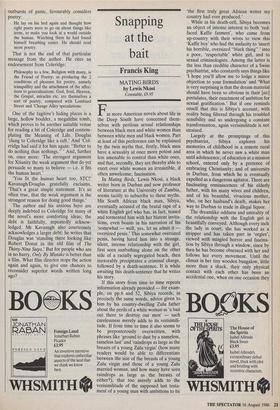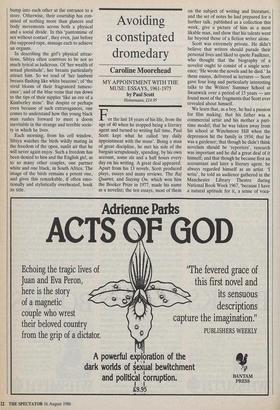Snapping at the bait
Francis King
MATING BIRDS by Lewis Nkosi Constable, £8.95 Far more American novels about life in the Deep South have concerned them- selves with perilous sexual relationships between black men and white women than between white men and black women; Part at least of this preference can be explained by the twin myths that, firstly, black men have a sexuality at once more potent and less amenable to control than white ones, and that, secondly, they are thereby able to exert over white women an irresistible, if often unwelcome, fascination.
In Mating Birds, Lewis Nkosi, a black writer born in Durban and now professor of literature at the University of Zambia, seems tacitly to subscribe to these myths. His South African black man, Sibiya, eventually accused of the brutal rape of a white English girl who has, in fact, teased and tormented him with her blatent invita- tions, even boasts in his narration of his 'somewhat — well, yes, let us admit it — oversized penis.' This somewhat oversized penis, having lured him into a strange, silent, intense relationship with the girl, first seen sunbathing alone on the other side of a racially segregated beach, then inexorably precipitates a criminal charge, followed by a death-sentence. It is while awaiting this death-sentence that he writes his story. If this story from time to time repeats information already provided — for exam- ple, on pp.6 and 52, Sibiya records, in precisely the same words, advice given to him by his country-dwelling Zulu father about the perils of a white woman as 'a bait out there to destroy our men' — such carelessness merely adds to its verisimili- tude. If from time to time it also seems to be preposterously overwritten, with phrases like 'ground to dust by a nameless, tameless lust' and 'raindrops as large as the breasts of a young Zulu virgin' (how many readers would be able to differentiate between the size of the breasts of a young Zulu virgin and those of a young Zulu married woman, and how many have seen raindrops as large as the breasts of either?), that too merely adds to the verisimilitude of the supposed last testa- ment of a young man with ambitions to be 'the first truly great African writer my country had ever produced.'
While in his death-cell, Sibiya becomes an object of intense interest to both 'red- faced Kaffir farmers', who come from up-country with their wives to view this 'Kaffir boy' who had the audacity to 'insert his horrible, oversized "black thing" 'into a poor, 'respectable' white girl, and to sexual criminologists. Among the latter is the less than credible character of a Swiss psychiatrist, who constantly says things like hope you'll allow me to lodge a minor objection to your formulation' and 'What is very surprising is that the dream material should have been so obvious in their [sic] postulates, their enactment of ambition for sexual gratification.' But if one reminds onself that this is Sibiya's account, with reality being filtered through his troubled sensibility and so undergoing a constant transformation, again verisimilitude is not strained.
Largely at the promptings of this psychiatrist, Sibiya explores his memories of childhood in a remote rural area in which he never saw a white man until adolescence; of education at a mission school, entered only by a pretence of embracing Christianity; and of university in Durban, from which he is eventually expelled as a dangerous agitator. There are fascinating reminiscences of his elderly father, with his many wives and children, and of his beautiful, vivacious mother, who, on her husband's death, makes her way to Durban to trade in illegal liquor.
The dreamlike oddness and unreality of the relationship with the English girl is beautifully conveyed. Although every inch the lady in court, she has worked as a stripper and has taken part in 'orgies', viewed with mingled horror and fascina- tion by Sibiya through a window, since by then he has become obsessed with her and follows her every movement. Until the climax in her tiny wooden bungalow, little more than a shack, their only physical contact with each other has been an accidental one, when on one occasion they bump into each other at the entrance to a store. Otherwise, their courtship has con- sisted of nothing more than glances and body movements across both a physical and a social divide. In this 'pantomime of sex without contact', they even, just before the supposed rape, manage each to achieve an orgasm.
In describing the girl's physical attrac- tions, Sibiya often contrives to be not so much lyrical as ludicrous. Of 'her wealth of sexual plenitude', her breasts particularly attract him. So we read of ter lambent breasts flashing like white beacons'; of 'the vivid bloom of their fragranced tumesc- ence'; and of the blue veins that run down to the tips of their nipples 'like an ore of a Kimberley mine'. But despite or perhaps even because of such extravagances, one comes to understand how this young black man rushes forward to meet a doom inevitable in the strange and terrible socie- ty in which he lives.
Each morning, from his cell window, Sibiya watches the birds wildly mating in the freedom of the open, sunlit air that he will never again enjoy. Such a freedom has been denied to him and the English girl, as to so many other couples, one partner white and one black, in South Africa. The image of the birds remains a potent one, and gives this remarkable, if often emo- tionally and stylistically overheated, book its title.











































 Previous page
Previous page